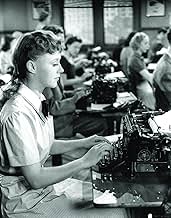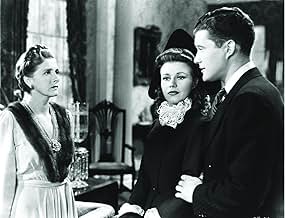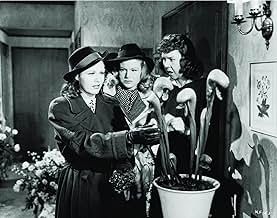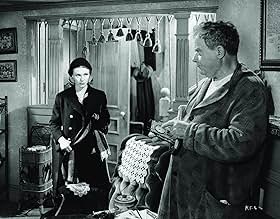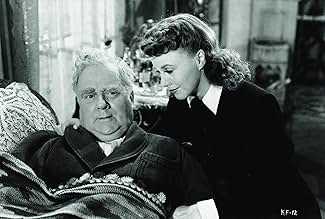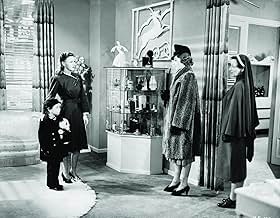IMDb-BEWERTUNG
6,9/10
4304
IHRE BEWERTUNG
Füge eine Handlung in deiner Sprache hinzuA hard-working white-collar girl from a middle-class family meets and falls in love with a young socialite, but she soon clashes with his family.A hard-working white-collar girl from a middle-class family meets and falls in love with a young socialite, but she soon clashes with his family.A hard-working white-collar girl from a middle-class family meets and falls in love with a young socialite, but she soon clashes with his family.
- Regie
- Drehbuch
- Hauptbesetzung
- 1 Oscar gewonnen
- 4 Gewinne & 4 Nominierungen insgesamt
Eduardo Ciannelli
- Giono
- (as Edward Ciannelli)
K.T. Stevens
- Molly
- (as Katharine Stevens)
Spencer Charters
- Father
- (Gelöschte Szenen)
Fred Aldrich
- Man at Premiere
- (Nicht genannt)
- …
Empfohlene Bewertungen
Ginger Rogers gives a good performance as "Kitty Foyle", making it worth seeing even though the film is otherwise a mostly average production. The story is worthwhile, but much of it is rather ordinary material, and it is somewhat slow. The rest of the cast is good enough, but most of the time does not come close to Rogers's level. There is nothing wrong with any of it, but not much of it really stands out.
Kitty, the main character, must make a number of choices during the course of the story, and is forced to weigh her options and her priorities. Rogers is believable and generally effective in portraying Kitty's thoughts and personality. The others in her life are mostly likable, yet most of the time they do not come to life in the way that Kitty does. Fortunately, Ginger is able to carry the load.
Many of us would have loved to see more Astaire-Rogers musicals, but you can see why Ginger wanted a chance to perform more dramatic roles, to show what she could do. This movie as a whole is generally pleasant and always watchable, but nothing special, and a number of her musicals were certainly better films. Nevertheless, it did give her a chance to do something different, and she did it well.
Kitty, the main character, must make a number of choices during the course of the story, and is forced to weigh her options and her priorities. Rogers is believable and generally effective in portraying Kitty's thoughts and personality. The others in her life are mostly likable, yet most of the time they do not come to life in the way that Kitty does. Fortunately, Ginger is able to carry the load.
Many of us would have loved to see more Astaire-Rogers musicals, but you can see why Ginger wanted a chance to perform more dramatic roles, to show what she could do. This movie as a whole is generally pleasant and always watchable, but nothing special, and a number of her musicals were certainly better films. Nevertheless, it did give her a chance to do something different, and she did it well.
While I still prefer a Ginger Rogers and Fred Astaire film like TOP HOT, this film is probably Ms. Rogers' best film because she is clearly THE star and the film gives her a good chance to show her acting ability. In fact, for this film she earned the Best Actress Oscar, though I really think that perhaps both Bette Davis' performance in THE LETTER and Katherine Hepburn's in PHILADELPHIA STORY were both a bit better. Perhaps she won that year because KITTY FOYLE is a very sentimental film or perhaps the other two actresses lost because they'd both already received that award. Or, perhaps Hepburn and Davis drew votes from each other. The bottom line, though, is Rogers is very good and compared to her other films, this one really stands out--even after all these years. My preferring the other performances in no way diminishes the fine job she did here. At the time, her winning was considered a big upset, though you can't deny all three performances were superb. And you really cannot be upset about her being chosen--she was deserving.
The film is a romance, though instead of being taught in the traditional linear fashion, it starts near the end and then is told in a long series of flashbacks. This really works well--especially because what you THINK Kitty is about to do at the beginning of the film isn't exactly what you might think. Additionally, these flashbacks are written and directed very deftly and so many little touches help to give this movie a heart. Especially touching were the ballroom dancing sequence with Dennis Morgan as well as the weepy section that soon follows. The bottom line is that this is a complex, well written and acted film that might require you keep a box of Kleenex nearby--just in case. See this movie!
The film is a romance, though instead of being taught in the traditional linear fashion, it starts near the end and then is told in a long series of flashbacks. This really works well--especially because what you THINK Kitty is about to do at the beginning of the film isn't exactly what you might think. Additionally, these flashbacks are written and directed very deftly and so many little touches help to give this movie a heart. Especially touching were the ballroom dancing sequence with Dennis Morgan as well as the weepy section that soon follows. The bottom line is that this is a complex, well written and acted film that might require you keep a box of Kleenex nearby--just in case. See this movie!
While I am quite fond of Ginger Rogers - both her performances and her personality - "Kitty Foyle" is not an Oscar-worthy film. Yes, she does a great job, but not superior to Hepburn ("The Philadelphia Story"), Davis ("The Letter"), Fontaine ("Rebecca") or Scott ("Our Town") - all nominated actresses in the same category.
The book upon which this film is based was somewhat controversial at the time - abortion, extramarital affairs, etc. - all verboten by the Production Code of the 40s/50s. Yes, they "cleaned up" the story for the screenplay, but it is still somewhat risque for 1940. Most likely, the subject matter contributed to Rogers winning the Oscar. (Of course, "The Philadelphia Story" is a bit suggestive as well - and certainly more sophisticated.)
Distracting to me are the unnecessary "prologue," and Rogers portraying (briefly) a twelve year-old! The scenes with her two female roommates are a welcome comedic interlude. Unlikely is the prospect of Foyle secretly giving her ex-boyfriend's engagement ring to his young son, and expecting the child's mother to never see it.
This is worth viewing, of course, but the Oscar went to the wrong person.
The book upon which this film is based was somewhat controversial at the time - abortion, extramarital affairs, etc. - all verboten by the Production Code of the 40s/50s. Yes, they "cleaned up" the story for the screenplay, but it is still somewhat risque for 1940. Most likely, the subject matter contributed to Rogers winning the Oscar. (Of course, "The Philadelphia Story" is a bit suggestive as well - and certainly more sophisticated.)
Distracting to me are the unnecessary "prologue," and Rogers portraying (briefly) a twelve year-old! The scenes with her two female roommates are a welcome comedic interlude. Unlikely is the prospect of Foyle secretly giving her ex-boyfriend's engagement ring to his young son, and expecting the child's mother to never see it.
This is worth viewing, of course, but the Oscar went to the wrong person.
The movie opens with a young woman, Kitty Foyle, assisting her doctor-sweetheart in delivering a child in a ramshackle tenement. They are a very compassionate pair. Afterwards he proposes marriage, she accepts and agrees meet him at midnight to be immediately married by an all-night Justice of the Peace. But while packing back at her hotel room, in pops an old flame, a wealthy married man who Kitty still desperately loves. He announces he has left his family and is leaving that night at midnight for South America. He still loves her, and wants her to join him. Oh, Kitty, what to do?
The remainder of the film is a series of flashbacks prompted by Kitty's image of herself in the mirror (i.e., her conscience) as it attempts to direct Kitty to the proper decision. Starting with her teenage years growing up working-class Irish in 1920s Philadelphia we learn how poor Kitty met and fell in love with a rich Mainline aristocat, and got herself in such a predicament.
Ms. Rogers won best actress for her role as Kitty, but the rest of the cast is no less deserving. A real movie treat.
The remainder of the film is a series of flashbacks prompted by Kitty's image of herself in the mirror (i.e., her conscience) as it attempts to direct Kitty to the proper decision. Starting with her teenage years growing up working-class Irish in 1920s Philadelphia we learn how poor Kitty met and fell in love with a rich Mainline aristocat, and got herself in such a predicament.
Ms. Rogers won best actress for her role as Kitty, but the rest of the cast is no less deserving. A real movie treat.
10Ariana-6
A wonderful story of a young woman caught between two worlds, what she wants and what she needs. This has got to be one of the best stories of all time. Ginger Rogers gives an outstanding performance of a young woman from the wrong side of the tracks that stands up to society and makes her way on her own.
It is incredibly forward thinking for the time period and yet it deals with struggles that seem to be timeless.
I give it as many stars as can be given.
Ariana Eirlys
It is incredibly forward thinking for the time period and yet it deals with struggles that seem to be timeless.
I give it as many stars as can be given.
Ariana Eirlys
Wusstest du schon
- WissenswertesAmong the many letters that Ginger Rogers received for her work in the film, this was the one that she treasured the most: "Hello Cutie-- Saw 'Kitty' last night and must write this note to say 'That's it!' Yes, yes, a thousand times yes! You were superb, Ginge--it was such a solid performance--the kind one seldom sees on stage or screen and it should bring you the highest honors anyone can win!! Hope to see you soon, As ever your, Fred."
- PatzerWhen Kitty and Wyn are in a speakeasy, the 1932 election returns are being broadcast over the radio. The announcer says that FDR has won Pennsylvania; Hoover won Pennsylvania in the election.
- Zitate
Kitty Foyle: Boy or Girl?
Dr. Mark Eisen: Boy. Almost lost the little fella. (Looks around the poor apartment) Mighta been better if he hadn't pulled through.
Kitty Foyle: Don't say that, Mark. It's always better to pull through.
- VerbindungenFeatured in Hollywood the Golden Years: The RKO Story: A Woman's Lot (1987)
- SoundtracksI Want a Girl (Just Like the Girl That Married Dear Old Dad)
(1911) (uncredited)
Music by Harry von Tilzer
Lyrics by William Dillon (as Will Dillon)
Played and sung in the first prologue scene Strummed on a banjo by Tyler Brooke
Top-Auswahl
Melde dich zum Bewerten an und greife auf die Watchlist für personalisierte Empfehlungen zu.
- How long is Kitty Foyle?Powered by Alexa
Details
- Erscheinungsdatum
- Herkunftsland
- Sprache
- Auch bekannt als
- Espejismo de amor
- Drehorte
- Produktionsfirma
- Weitere beteiligte Unternehmen bei IMDbPro anzeigen
- Laufzeit1 Stunde 48 Minuten
- Farbe
- Seitenverhältnis
- 1.37 : 1
Zu dieser Seite beitragen
Bearbeitung vorschlagen oder fehlenden Inhalt hinzufügen



